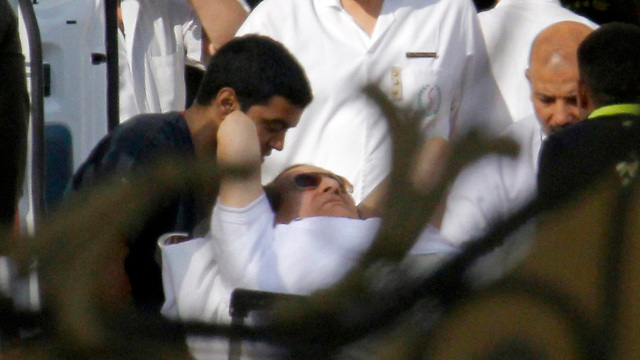
Supporters of Egypt's Morsi call protests against army
After Mubarak's release from prison, pro-Morsi alliance calls for new round of protests, dubs event: 'Friday of Martyrs'
Egyptians are enduring the bloodiest crisis of their modern history after the military overthrew Morsi on July 3 following demonstrations against his rule. It dispersed his supporters' protest camps on Aug. 14 and launched a campaign of arrests that has already netted the group's general guide Mohamed Badie.
Related stories:
- Egypt's ousted leader Hosni Mubarak released
- Egyptian army enters barricaded pro-Morsi mosque
- Egypt's ElBaradei faces court for 'betrayal of trust'
At least 900 people, including 100 soldiers and police, have been killed in the crackdown on Morsi supporters in the past week, according to government sources. Brotherhood supporters say the real figure is far higher.
The clampdown appears to have weakened the Arab world's oldest and arguably most influential Islamist group, which won five successive elections in Egypt following the 2011 uprising that swept Morsi's predecessor, Hosni Mubarak, from power.
Pro-Morsi protests have fizzled out over the past week. The muted reaction to the release of Mubarak on Thursday highlighted the growing power shift in favor of the military he once commanded.
Brotherhood supporters have nevertheless called on Egyptians to hold marches on the weekly Muslim prayer day, billed as a "Friday of Martyrs", against the army takeover.
"We will remain steadfast on the road to defeating the military coup," a pro-Morsi alliance called the National Coalition to Support Legitimacy and Reject the Coup said in a statement. It named 28 mosques in Greater Cairo as points of departure for the protests.
Old order
Mubarak was flown from jail on Thursday in a symbolic victory for the army-dominated old order that has imprisoned his freely-elected Islamist successor.

Mubarak en route from prison to hospital (Photo: AP)
A blue-and-white helicopter took Mubarak from Cairo's Tora prison, where scores of his supporters had gathered to hail his release. He was flown to a military hospital in the nearby southern suburb of Maadi, officials said.
For Mubarak's enemies, the moment marked a reversal of the 2011 uprising that brought him down as one of the pillars of authoritarian rule in the Middle East.
Mubarak's release plays into the Brotherhood's argument that the military is trying to rehabilitate the old order. The army-installed government casts its conflict with the Islamist movement as a life-or-death struggle against terrorism.
"This is the end. Mubarak will never be an important political player, but symbolically, it's a victory dance by the reconstituted old state," said Joshua Stacher, an Egypt expert at Kent State University in the United States.
Adding to a sense among some activists that the freedoms won in the 2011 revolt are in danger, planned amendments to the constitution leaked to the media this week appear designed to place limits on political parties and ease restrictions on the participation of Mubarak-era officials in politics.
But some Egyptians, many of whom have rallied behind the army's crackdown, expressed fondness for the 85-year-old former air force commander whose tight grip on power brought stability.
"He protected the country," said Lobna Mohamed, a housewife in the crowd of Mubarak well-wishers. "He is a good man, but we want (Abdel Fattah) Sisi now," she said, referring to the army commander who overthrew Mursi following large demonstrations.
A senior figure in the Mubarak-era reigning party spoke to Ynet from Cairo and said that Mubarak's arrest and incarceration were political moves intended to calm down Egyptians' anger.
"The meaning of releasing Mubarak – who is already quite old – is not that he will return to political life, but rather that millions of his Egyptian supporters can return to political life," he said.
After his ouster, all members of his political party were barred from participating in political life in Egypt. Now, some say, his release will pave the way for their return to political life.
Mubarak was sentenced to life in prison last year for failing to prevent the killing of demonstrators. But a court accepted his appeal earlier this year and ordered a retrial in the case, for which he has already served the maximum amount of pretrial detention. Mubarak was arrested in April, 2011.
Roi Kais contributed to this report
- Receive Ynetnews updates directly to your desktop










